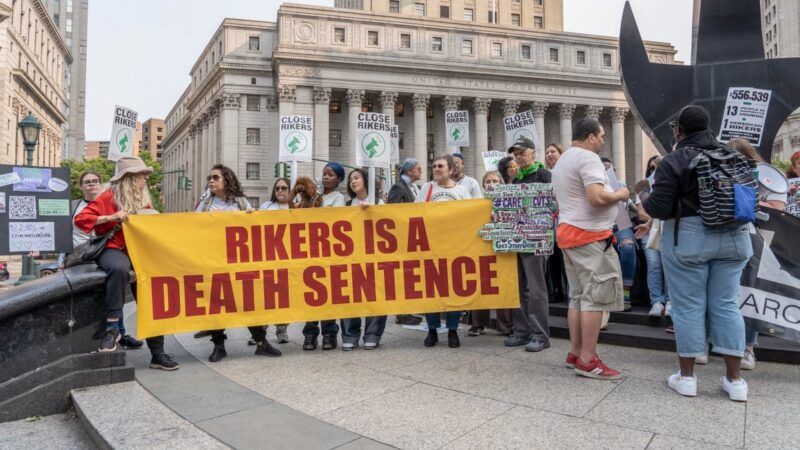Federal Judge Tells New York City To Brace for Takeover of Rikers After Contempt Finding
A federal judge ruled that New York City was in violation of 18 different provisions of a court-enforced plan to clean up the infamous Rikers Island jail complex.

A federal judge has ordered New York City to draft plans to hand over management of its Rikers Island jail complex to a third-party receiver after holding the city's Department of Corrections (DOC) in civil contempt for failing to meet more than a dozen requirements to improve conditions in its violence-wracked jails.
In an opinion and order issued Tuesday, Chief U.S. District Judge for the Southern District of New York Laura Taylor Swain wrote that she was "inclined to impose a receivership" after finding that violence and death inside Rikers has not improved since New York City agreed to a court-enforced reform plan in 2015.
In fact, "the use of force rate and other rates of violence, self-harm, and deaths in custody are demonstrably worse," Swain wrote.
Swain found the DOC in contempt of 18 different provisions of the consent agreement. That agreement was the result of a class action lawsuit filed in 2012 by the Legal Aid Society of New York alleging rampant brutality by guards against jail detainees. In a press release, the Legal Aid Society commended the court's "historic decision" to find the DOC in contempt.
"The culture of brutality on Rikers Island has resisted judicial and political reform efforts for years," the Legal Aid Society said. "As the court found, the City has repeatedly demonstrated its inability to provide the oversight necessary to ensure the safety of all individuals housed in local jails."
In recent years, chronic violence, corruption, and negligence inside Rikers exploded to record levels. The crisis at Rikers has been one of the most high-profile examples of bureaucratic indifference to unconstitutional suffering in prisons and jails across the country. Losing control of Rikers would be a huge embarrassment for New York City, but it would come after years of active resistance by city officials and prison guard unions to efforts to clean up the island jail.
In 2021, a New York state judge ordered a pretrial inmate released from Rikers after he presented credible video evidence that he'd been forced to perform in a "fight night" organized by gang leaders while guards watched on. A New York state senator said lawmakers touring Rikers that same year saw a man trying to kill himself. A public defender who toured the jail told The Intercept that inmates in one segregated intake unit were locked in small showers and given plastic bags to defecate into.
The court-appointed monitoring team repeatedly documented widespread security lapses, failures to help inmates who were trying to commit suicide in plain view of officers, and a small guard rotation working double and triple shifts.
While New York City opposes putting Rikers in receivership, in court filings it largely did not dispute the Legal Aid Society's arguments that it was in contempt of the consent agreement. Nor could it. Swain concluded that the plain facts showed the DOC had failed to mitigate daily violence, excessive force, poor conditions, and lax suicide protocols in its jails.
"The record in this case makes clear that those who live and work in the jails on Rikers Island are faced with grave and immediate threats of danger, as well as actual harm, on a daily basis as a direct result of Defendants' lack of diligence, and that the remedial efforts thus far undertaken by the Court, the Monitoring Team, and the parties have not been effective to alleviate this danger," Swain wrote.
Swain had previously rejected calls from the Legal Aid Society to place Rikers under federal receivership to give time for leadership shakeups at the DOC to take effect, but Swain wrote this week that she has lost confidence that the court can trust the city to work in good faith:
"The last nine years also leave no doubt that continued insistence on compliance with the Court's orders by persons answerable principally to political authorities would lead only to confrontation and delay; that the current management structure and staffing are insufficient to turn the tide within a reasonable period; that Defendants have consistently fallen short of the requisite compliance with Court orders for years, at times under circumstances that suggest bad faith; and that enormous resources—that the City devotes to a system that is at the same time overstaffed and underserved—are not being deployed effectively."
Swain has ordered the court monitoring team and both parties in the lawsuit to draft memos including proposed frameworks for a third-party receivership of Rikers, along with legal arguments in favor or opposition, by January 14, 2025.


Show Comments (21)